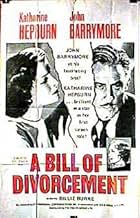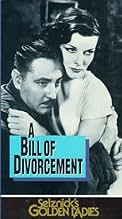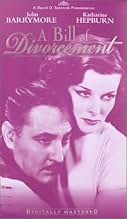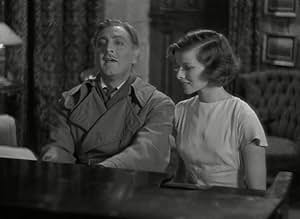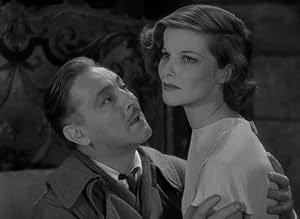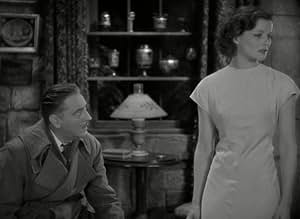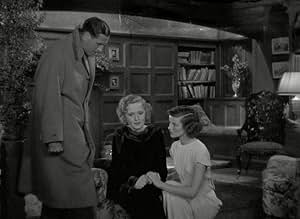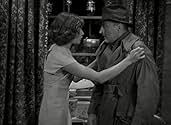Un hombre, Hilary Fairfield regresa a casa después de quince años en un manicomio. Sin embargo, descubre que las cosas no son como eran cuando se fue.Un hombre, Hilary Fairfield regresa a casa después de quince años en un manicomio. Sin embargo, descubre que las cosas no son como eran cuando se fue.Un hombre, Hilary Fairfield regresa a casa después de quince años en un manicomio. Sin embargo, descubre que las cosas no son como eran cuando se fue.
- Dirección
- Guionistas
- Elenco
- Premios
- 5 premios ganados en total
Bramwell Fletcher
- Gareth
- (sin créditos)
Dick French
- Party Guest
- (sin créditos)
Julie Haydon
- Party Guest
- (sin créditos)
Dennis O'Keefe
- Party Guest
- (sin créditos)
Mildred Shay
- Party Guest
- (sin créditos)
- Dirección
- Guionistas
- Todo el elenco y el equipo
- Producción, taquilla y más en IMDbPro
Opiniones destacadas
A touching, very well done movie. Of course it sounds and looks stagy. Of course the acting seems melodramatic. This is the very early years of talkies, and the material is a play that was already 10 years old in 1932! That gives us some idea of how desperately Hollywood was searching for material with which to make talking pictures. John Barrymore, as other people have said, was on the slippery slope of alcoholism and lived only 10 more years, each more debilitated than the previous one. Yet he never lost his ability and it is a shame he didn't get to be in better films. He could always act! And he knew that his style was dated. He said that his was a 'middle' generation of stage acting, between the florid romantic style of the late 19th and early 20th centuries and the more naturalistic style that followed. Any time he worked with actors and directors he respected: Marie Dressler, Greta Garbo, Hepburn, Billie Burke, Carole Lombard, George Cukor, Howard Hawks --Barrymore turned in an excellent performance.
Katharine's Hepburn's screen debut proved to be a stronger film than I expected, starring alongside the great John Barrymore in this tragic mental illness melodrama and when I say tragic, I do mean tragic. Boy does this movie lay it on thick but it sure made this viewer's hear sink. Even before Barrymore appears on screen I was already starting to feel sorry for this character upon learning he's spent years at a mental asylum with shell shock and couldn't pursue his music, and that's only the beginning. You know that dirty word people like to throw around, "manipulative"; well this movie certainly manipulated me. Yet despite the story laying additional tragic layers after another, the performances make it work and prevent it from coming come off as totally ridiculous.
Watching Katharine Hepburn I would never have guessed this was her first film, she is entirely natural and gives the impression of someone has much acting experience. Plus she was never more youthful than she is here, springing full of energy and life. Supposedly director George Cuckor inserted shots in the film which did nothing to advance the story nor deepen character but were simply lingering shots of Hepburn in which the audience could adjust and get acquainted with her.
John Barrymore, however, is the main star of the show. Throughout the film there is a sadness and fragile nature of his voice while he denies the reality of the situation to himself and pulling the puppy dog eyes; with the occasional scenery chewing outburst. He's a ham but a lovable ham. I feel the most powerful moment in the film is the scene in which Barrymore breaks into tears into the arms of his neglectful wife (Billie Burke) while she can't even bear to look at him; I almost broke into a tear myself.
I've read many comments describing the film "stagey" - not at all. Shots are framed with depth, often at different angles and with objects framed in the foreground; George Cukor was a better director than that. A Bill of Divorcement is a heart sinker if there ever was one.
Watching Katharine Hepburn I would never have guessed this was her first film, she is entirely natural and gives the impression of someone has much acting experience. Plus she was never more youthful than she is here, springing full of energy and life. Supposedly director George Cuckor inserted shots in the film which did nothing to advance the story nor deepen character but were simply lingering shots of Hepburn in which the audience could adjust and get acquainted with her.
John Barrymore, however, is the main star of the show. Throughout the film there is a sadness and fragile nature of his voice while he denies the reality of the situation to himself and pulling the puppy dog eyes; with the occasional scenery chewing outburst. He's a ham but a lovable ham. I feel the most powerful moment in the film is the scene in which Barrymore breaks into tears into the arms of his neglectful wife (Billie Burke) while she can't even bear to look at him; I almost broke into a tear myself.
I've read many comments describing the film "stagey" - not at all. Shots are framed with depth, often at different angles and with objects framed in the foreground; George Cukor was a better director than that. A Bill of Divorcement is a heart sinker if there ever was one.
At the start of A Bill of Divorcement, Billie Burke is hosting a glorious Christmas party for her family and friends. She's celebrating with her fiancé Paul Cavanagh, for they plan to take a vacation at New Year's and marry. Her sister-in-law Elizabeth Patterson disapproves because she still values Billie's first marriage to her brother, John Barrymore. After he came home from the war, John's shell shock devolved into insanity, and he's been in an asylum for fifteen years. When John escapes from the asylum, anxious to reclaim his place in the family, he's in for a rude awakening.
John Barrymore gives a wonderful, heartbreaking performance as the insane patriarch. His emotions are highly volatile and all worn on his sleeve, which fits his character and the situation perfectly. When he first comes home, he chances upon a young woman he believes to be his wife. It's actually Katharine Hepburn, his daughter all grown up, and the two have some very touching emotional scenes together. I don't know why this film was ignored at the Oscars, but it wasn't ignored at the Hot Toasty Rags. This is a very well-acted, well-written, thoughtful piece. Bring your Kleenexes when you sit down for this heavy drama. It might not be clear from the cheerful first scene, but you'll be in for quite a few tears by the end.
John Barrymore gives a wonderful, heartbreaking performance as the insane patriarch. His emotions are highly volatile and all worn on his sleeve, which fits his character and the situation perfectly. When he first comes home, he chances upon a young woman he believes to be his wife. It's actually Katharine Hepburn, his daughter all grown up, and the two have some very touching emotional scenes together. I don't know why this film was ignored at the Oscars, but it wasn't ignored at the Hot Toasty Rags. This is a very well-acted, well-written, thoughtful piece. Bring your Kleenexes when you sit down for this heavy drama. It might not be clear from the cheerful first scene, but you'll be in for quite a few tears by the end.
It's Christmas in England. World War I veteran John Barrymore (as Hilary Fairfield) has been committed to an asylum for 15 years, due to insanity brought on by "shell shock". The season has resulted in a blessing for Mr. Barrymore, who is on his way home for the holidays, after recovering his sanity. Meanwhile, wife Billie Burke (as Margaret "Meg" Fairfield) has fallen in love again, received a divorce, and is planning to re-marry. Barrymore's return throws the household into turmoil. Daughter Katharine Hepburn (as Sidney Fairfield), also planning to marry, begins to fear starting her own family, after learning Barrymore's madness is hereditary.
It's admittedly not intended as such, and consequently not exceptional; but, George Cukor's "A Bill of Divorcement" should be seen as a filmed stage play. The story is thought-provoking; it mixes madness, marriage, and war with duty, self-sacrifice, and religion. The characterizations are, today, "outdated" in style, substance, and storyline. Still, they are interesting in context. The three lead performances are significant: Barrymore's theatrical skills are clearly evident; his performance is most enjoyable (the war duty scene is a highlight). Additionally, Ms. Burke begins a welcome "second career" in sound films; and Ms. Hepburn begins a welcome "second career" in films. With less to do, steadfast supporting actress Elizabeth Patterson (as Hester Fairfield) definitely holds her own.
****** A Bill of Divorcement (1932) George Cukor ~ John Barrymore, Billie Burke, Katharine Hepburn
It's admittedly not intended as such, and consequently not exceptional; but, George Cukor's "A Bill of Divorcement" should be seen as a filmed stage play. The story is thought-provoking; it mixes madness, marriage, and war with duty, self-sacrifice, and religion. The characterizations are, today, "outdated" in style, substance, and storyline. Still, they are interesting in context. The three lead performances are significant: Barrymore's theatrical skills are clearly evident; his performance is most enjoyable (the war duty scene is a highlight). Additionally, Ms. Burke begins a welcome "second career" in sound films; and Ms. Hepburn begins a welcome "second career" in films. With less to do, steadfast supporting actress Elizabeth Patterson (as Hester Fairfield) definitely holds her own.
****** A Bill of Divorcement (1932) George Cukor ~ John Barrymore, Billie Burke, Katharine Hepburn
VERY stagy but interesting film served as Hepburn's screen bow. She's a trifle studied and Barrymore occasionally goes over the top but mixed in with that is some excellent acting by both. Billie Burke, more subdued than usual, delivers the film's best most consistent performance. She does a very fine job of showing the anguish of a life suddenly turned upside down. The three of them are really the whole show.
Considering the cast and the historical place in Kate's filmography as her debut the film is frustratingly difficult to see. Odd considering the relative availability of the rest of her canon, exempting the obscure Grace Quigley.
Some of the attitudes are dated but because of the star trio this is worth tracking down.
Considering the cast and the historical place in Kate's filmography as her debut the film is frustratingly difficult to see. Odd considering the relative availability of the rest of her canon, exempting the obscure Grace Quigley.
Some of the attitudes are dated but because of the star trio this is worth tracking down.
¿Sabías que…?
- TriviaDavid O. Selznick and George Cukor disagreed about casting Katharine Hepburn. Cukor had seen Hepburn's screen test and was impressed by the 24-year-old, but Selznick did not like the way she looked and was afraid she would not be well received by audiences. Cukor cast her anyway (beginning what would be a lifelong professional and personal relationship between the two)
- Errores'Katharine Hepburn' is misspelled in the credits as 'Katherine Hepburn'.
- Citas
Hilary Fairfield: Do you know what the dead do in Heaven? They sit on their golden chairs and sicken for home.
- Créditos curiososSydney Fairfield is the name of Katharine Hepburn's character in the film, but her name is spelled Sidney in the credits.
- ConexionesFeatured in David O. Selznick: 'Your New Producer' (1935)
- Bandas sonorasSilent Night, Holy Night (1818)
(uncredited)
Music by Franz Xaver Gruber
Lyrics by Joseph Mohr
English lyrics anonymous
Sung by carollers on Christmas Eve
Selecciones populares
Inicia sesión para calificar y agrega a la lista de videos para obtener recomendaciones personalizadas
- How long is A Bill of Divorcement?Con tecnología de Alexa
Detalles
- Fecha de lanzamiento
- País de origen
- Idioma
- También se conoce como
- Račun za razvod
- Locaciones de filmación
- Productora
- Ver más créditos de la compañía en IMDbPro
Taquilla
- Presupuesto
- USD 300,000 (estimado)
- Tiempo de ejecución1 hora 10 minutos
- Color
- Relación de aspecto
- 1.37 : 1
Contribuir a esta página
Sugiere una edición o agrega el contenido que falta

Principales brechas de datos
By what name was A Bill of Divorcement (1932) officially released in Canada in English?
Responda
